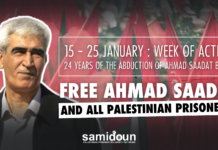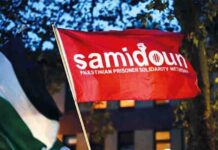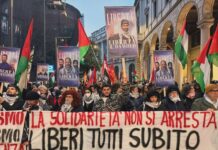The Irish republican socialist organization éirígí issued the following call to action in support of imprisoned Palestinian hunger-striking journalist Mohammed al-Qeeq. Samidoun Palestinian Prisoner Solidarity Network expresses its mutual solidarity with the Irish people’s struggle for freedom and unity, and notes the role Irish political prisoners and hunger strikers have played in the global movement for justice:
éirígí is urging all supporters of the Palestinian struggle for justice and freedom to show solidarity with Mohammed al-Qeeq, currently imprisoned without charge or trial, as he approaches a critical phase in his hunger-strike to obtain his complete release.
The imprisoned Palestinian journalist has been on hunger-strike for over seventy days and has rejected the “suspension” of the administrative detention order against him by the Israeli Supreme Court.
His hunger strike continues and he is now on his 73rd day without food (Friday 5th February).
Administrative detention is the Israeli equivalent to internment without trial which Britain has regularly used in Ireland and other countries, including Palestine during the period of the ‘British Mandate’ in that country.
The Israeli court “suspended” the detention order as Al-Qeeq’s condition deteriorates rapidly by the day after almost two and half months on hunger-strike. He remains captive, under Israeli custody, and is forbidden from moving to a Palestinian or other hospital.
Yesterday (4 February), thirty-three year old Mohammed Al-Qeeq issued a statement through his lawyer, Hanan al-Khatib, in which the imprisoned journalist rejected the Israeli court decision, as he is demanding his complete freedom and the cancellation of his administrative detention without charge or trial – not its “suspension” and re-imposition at a later date.
Al-Khatib reported that the statement contained the following points
· First: Mohammed Al-Qeeq ‘s rejection of the “suspension” of administrative detention, which is an attempt to undermine solidarity with the hunger strike and deceive the world. He refuses to visit with his family in the occupation hospitals; his demand is for treatment only in Palestinian hospitals after the full and unconditional termination of his detention; this decision is clear.
· Second: The occupation and the Israeli prison managements bear full responsibility for his life, because this is an attempt to disclaim responsibility for any developments on his health.
· Third: This does not indicate any intention by the occupation to resolve this case: he refuses treatment in occupation hospitals and confirms that his hunger strike continues and will not stop until he wins his freedom.
· Fourth: He calls on all free voices in the world to intensify their solidarity with him now, in response to this decision, which is tantamount to execution under a medical and legal cover.
Al-Qeeq’s position was fully supported by his family who called the suspension of his detention a murder and an execution under the pretext of medical treatment and a way to dodge responsibility for anything that may happen to him.” The family joined his refusal of visits in HaEmek hospital, noting that his demand is for treatment in a Palestinian hospital.
The Palestinian Prisoners’ Affairs Commission reported that Al-Qeeq reiterated his rejection of receiving vitamins or any form of nutrition or medical examinations until he receives his freedom and an end to administrative detention, and stated that he will only accept treatment from Palestinian hospitals. The Commission also stated that al-Qeeq said that the Supreme Court “suspension” is an attempt to circumvent and undermine his legitimate resistance to the inhumane, arbitrary and immoral practice of administrative detention. The Israeli court decision is widely viewed as an attempt to silence the growing international movement against administrative detention without charge or trial.
The PPAC statement also noted that al-Qeeq’s continued detention is an attack on his freedom of opinion and expression as a journalist, and that this decision only underlines the Israeli judiciary’s role as part and parcel of the same system of occupation and oppression as the Shin Bet (the Israeli secret intelligence service) and the Israeli military.
Al-Qeeq is one of over 670 Palestinian prisoners held in administrative detention without charge or trial. In total, approximately 7,000 Palestinian prisoners are imprisoned in Israeli jails
Discover more from Samidoun: Palestinian Prisoner Solidarity Network
Subscribe to get the latest posts sent to your email.





